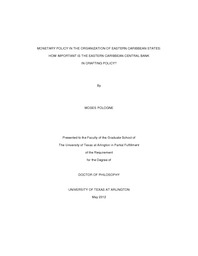
ATTENTION: The works hosted here are being migrated to a new repository that will consolidate resources, improve discoverability, and better show UTA's research impact on the global community. We will update authors as the migration progresses. Please see MavMatrix for more information.
Show simple item record
| dc.contributor.author | Pologne, Moses | en_US |
| dc.date.accessioned | 2012-07-25T19:09:50Z | |
| dc.date.available | 2012-07-25T19:09:50Z | |
| dc.date.issued | 2012-07-25 | |
| dc.date.submitted | January 2012 | en_US |
| dc.identifier.other | DISS-11768 | en_US |
| dc.identifier.uri | http://hdl.handle.net/10106/11102 | |
| dc.description.abstract | The research examines the effectiveness of monetary policy in improving standards of living at the local level in the Organization of Eastern Caribbean States. The study postulates that monetary policy should not be viewed strictly as the responsibility of the national government, instead, under specific conditions it can be viewed as a local economic development strategy. A combination of interviews and econometric techniques are applied to determine whether monetary policy is as useful as other more widely discussed variables in urban planning and policy making. The findings support monetary policy as a local economic development strategy in situations where certain conditions are satisfied. In addition, monetary policy is found to be equally as important as other variables more frequently discussed in the literature, such as government expenditures, employment and imported input prices. | en_US |
| dc.description.sponsorship | Hissong, Rod | en_US |
| dc.language.iso | en | en_US |
| dc.publisher | Urban & Public Affairs | en_US |
| dc.title | Monetary Policy In The Organization Of Eastern Caribbean States: How Important Is The Eastern Caribbean Central Bank In Crafting Policy | en_US |
| dc.type | Ph.D. | en_US |
| dc.contributor.committeeChair | Hissong, Rod | en_US |
| dc.degree.department | Urban & Public Affairs | en_US |
| dc.degree.discipline | Urban & Public Affairs | en_US |
| dc.degree.grantor | University of Texas at Arlington | en_US |
| dc.degree.level | doctoral | en_US |
| dc.degree.name | Ph.D. | en_US |
Files in this item
- Name:
- Pologne_uta_2502D_11768.pdf
- Size:
- 2.078Mb
- Format:
- PDF
This item appears in the following Collection(s)
Show simple item record


